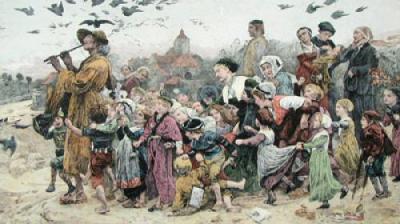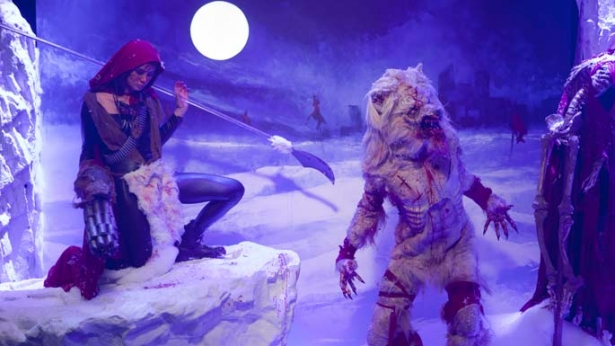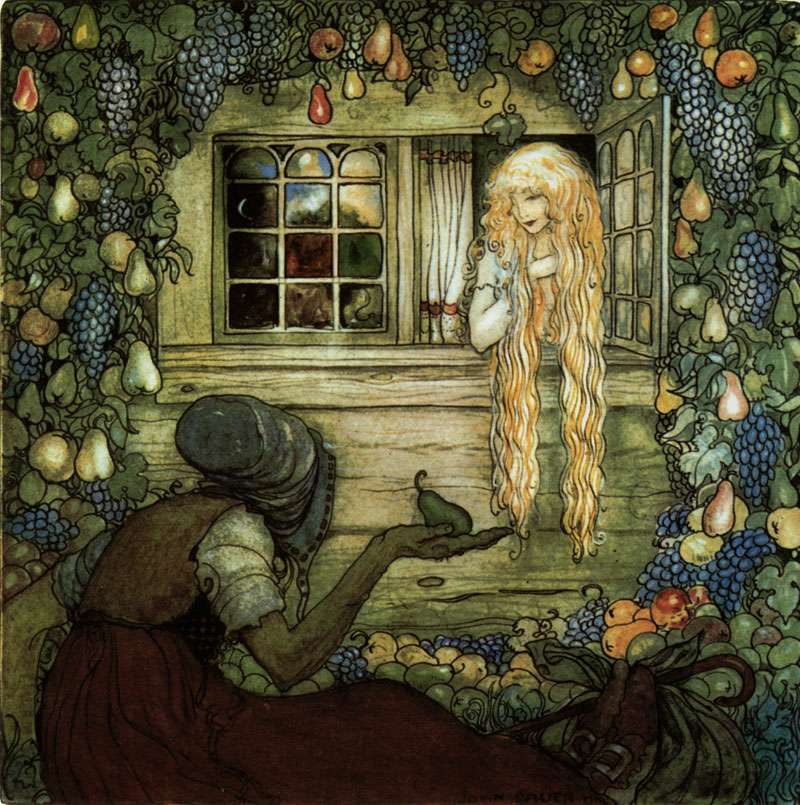"A Prince and his lady lived in their palace with two children, a son and a daughter. When the young prince was twenty he got married and lived in the family castle, as is proper. The girl, on the other hand, had extravagant ideas. She systematically refused all marriage proposals, having sworn that she would marry no one save a prince who had a blue beard.
"Now, one day the trumpet of the guard announced the arrival of a magnificent carriage. It was a giant, who was reputed to be a great hunter, and this giant had a blue beard. He accepted hospitality, as was the custom. The girl was presented to him, and he pleased the capricious child. The marriage was celebrated the following day and the ather gave a hunting party in which the son-in-law distinguished himself.
"Then came the day for departure; the giant was taking his wife away to his distant castle.
"The mother, who loved her daughter a great deal, conided in her: 'What dowry can I give you, my child? Gold? But where you're going you'll have a castle and treasures. Horses? The giant has marvelous horses. I'm going to give you these three birds, the pride of my aviary, the black dove, the white dove, and the red dove. Thus we shall have news from you, for you will be far away. Listen carefully: when you are in good health and living compatibly with your husband, you will send the red one; when you are ill, you will send the white one; but if discord or misfortune should befall, send at once the black dove.'
"Of course the father and mother accompanied the young wife to her new domain, but they returned as is customary at the end of a few days. Bluebeard had but one occupation and but one passion: hunting, to which he devoted himself all day long.
"One day, taking leave of his wife, he gave her a bunch of keys. 'Wife, here are nine keys. Each of them opens one chamber. But I forbid you to use the ninth and go into the room at the end of the hall.'
'Good, my lord.'
He assembled his dogs and left on horseback. Meanwhile his wife made an inventory of the castle. All women are curious; the lady of the manor went into the eight chambers, but that didn't suffice her. Her fingers wanted to turn the ninth key in the lock. 'Anyhow, I'm going to visit the last chamber.'"

The wife discovered a large basin filled with blood, and raised her eyes. The key slipped from her hand as she saw eight corpses of women hanging by chains from hooks in the ceiling.
She took the key and left the chamber, but no matter how she scrubbed the key, she could not get rid of the bloodstain. When her husband came home, he demanded the keys. When he saw the bloodstain, he knew she had counted the corpses and demanded that she go upstairs to put on her loveliest robes, and in half an hour she would be hung on a hook with the others.

The woman went to her chamber and sent the black dove home. Downstairs her husband lit a fire and was boiling oil in an enormous cauldron. He kept calling for his wife to come down, and the wife kept stalling, saying she needed to put on yet another article of clothing-each time she asked the white dove what he saw out the window. For a while the dove saw nothing but the Sun and wind, but finally noticed dust on the road. The next time Bluebeard called, the dove saw two knights on the way.

Bluebeard was getting angry that his wife had not come down yet. The knights arrived and broke down the barricade in the door.
" 'You arrived in the nick of time,' replied the giant, without being discourntenanced. 'It's perfect. My wife is all dressed for dinner. Let's have a feast.'
"They enjoyed a hearty meal where meat and wine were not lacking. Finally Bluebeard fell into a deep sleep. Had he drunk too much? Or else had someone poured a sleeping powder into his wine? In any case, he fell to snoring with his mouth wide open. With the aid of a funnel his guests poured a big dipper of boiling oil into his throat. He choked to death. Then they washed the key with that oil, and the bloodstain disappeared.
"This done, all three took leave without delay. They inherited rightfully the domains of the deceased, so they had two castles. It's a very sad truth that in this world some have too much wealth whereas others, of which I am one, haven't enough.
"I've gone as far as my fields extend,
So my tale is at the end."
-Tale from The Borzoi Book of French Folk Tales, selected and edited by Paul Delarue
-Images by Arthur Rackham





























